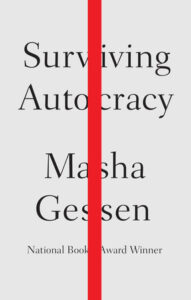Constitution crisis?
October 29, 2020We could be close. It’s important for us to understand how a crisis could unfold and what we can do.
This TED Talk was recorded three days ago with CNN political Commentator Van Jones.
“If the 2020 US presidential election is close, the race could drag on in the courts and halls of Congress long after ballots are cast, says lawyer and political commentator Van Jones. Explaining why the customary concession speech is one of the most important safeguards for democracy, Jones exposes shocking legal loopholes that could enable a candidate to grab power even if they lose both the popular vote and the electoral college — and shares what ordinary citizens can do if there’s no peaceful transfer of power.”
[16:00]
It is truly remarkable how are elections are foundational to norms and behaviors, not necessarily names in the Constitution. A very real concern could be the ‘private armed militia’ Jones draws reference to. To learn more about a growing militia group featured on a recent episode of Fresh Air, follow this link:
https://www.npr.org/2020/10/26/927796915/pro-trump-militias-election-day-beyond
‘Atlantic’ writer Mike Giglio profiles the Oath Keepers, a pro-Trump militia group, in a new article. They have recruited thousands of police, soldiers and veterans. We talk about what they might do on Election Day and after. “We, as Americans, are so comfortable with the idea of sending people out into foreign wars. And now [these militia groups are] starting to look at America itself as a part of that battle space.” Giglio also shares insights from covering civil wars overseas.
[Dr. Strangelove]
Another podcast I listened to recently…Radiolab…explains Constitutional crisis following ‘what if’ scenarios with a group of experts and political operatives who play these types of ‘war games.’
There’s plenty of speculation about what Donald Trump might do in the wake of the election. Would he dispute the results if he loses? Would he simply refuse to leave office, or even try to use the military to maintain control? Last summer, Rosa Brooks got together a team of experts and political operatives from both sides of the aisle to ask a slightly different question. Rather than arguing about whether he’d do those things, they dug into what exactly would happen if he did. Part war game part choose your own adventure, Rosa’s Transition Integrity Project doesn’t give us any predictions, and it isn’t a referendum on Trump. Instead, it’s a deeply illuminating stress test on our laws, our institutions, and on the commitment to democracy written into the constitution.
This episode was reported by Bethel Habte, with help from Tracie Hunte, and produced by Bethel Habte. Jeremy Bloom provided original music.
[41:00]
https://www.wnycstudios.org/podcasts/radiolab/articles/what-if
The 19th
Voting during the 19th Amendment’s centennial wasn’t supposed to be this way
“The moment was supposed to be a bright spot in an otherwise chaotic and uncertain year,” wrote Errin Haines, The 19th’s editor-at-large. “Instead, it would leave me feeling that chaos and uncertainty more acutely than ever.”
We’re the only newsroom dedicated to writing about gender, politics and policy.
As the pandemic rages and voter enthusiasm is at a record high, Americans are being urged to make a plan to cast their ballot in the most consequential election many of us will ever live through.
My plan was to vote early, something I did frequently in my native Georgia before moving to Philadelphia five years ago. Because of the pandemic, Pennsylvania allowed voting before Election Day for the first time this year.
[…]
On Monday, I emerged exhausted, demoralized and enraged after four hours of standing in line.
How, in the city where the Constitution was written and signed, where we celebrate the founding principles of democracy, is this happening? I was angry not for myself, but on behalf of the Philadelphians who could be disenfranchised this election. I am someone who had four hours to stand in line; there are too many who live in this city who do not.
It wasn’t supposed to be this way.
I wondered how many people passed by, saw the line, and kept walking or driving.”
Full read:
https://19thnews.org/2020/10/voting-long-lines-philadelphia-19th-amendment-centennial/
#MustRead from Anand
Last exit before autocracy
A conversation with Masha Gessen on how to prevent “autocratic breakthrough,” why Russiagate was a “crutch” for the left, and what really happened in that New Yorker election s(t)imulation Zoom
A reelected Donald Trump, abetted by a 6-3 Supreme Court, is truly a terrifying prospect — very possibly the end of the American republic in any real sense. But we are not there yet. Where we are, in fact, is in the liminal space where it is still possible to achieve a different future.
This looming election may well be the last exit before autocracy.
That was one of the things I carried away from my conversation with the brilliant Masha Gessen, whose wisdom I’m so happy to be sharing with you today. This era has revealed its share of charlatans and criminals and fools. But it has also revealed genuine heroes — including intellectual ones. One of mine is Masha.
Masha is a journalist and writer and thinker who spent the first part of their career in Russia, writing about science, democracy, autocracy, and disease. Then they made a home in America, where it turned out that some understanding of science, democracy, autocracy, and disease would prove very handy.
Masha was made for this moment. To be clear, given their interests, you actually never want to be living in a time and place that Masha was made for, but here we are.
The question is what happens next. If he, God willing, wins, I think that in some ways Biden can be a transformative president, because I think that there’s a grand ambition there, that’s become very clear, to invest in infrastructure, to create a new welfare state, to bring the country together in some really, I think, beautiful ways.
What gives me hope is distinct from the question of whether I’m optimistic. I can be incredibly pessimistic, but hope is a necessity of survival and a moral imperative. I hope because I have to, because a better future is possible. The foundational requirement for it is hope.
Full Q&A
https://the.ink/p/how-to-block-an-autocratic-breakthrough
Masha:
I use the word autocracy intentionally, instead of authoritarianism, for two reasons. One is because I’ve spent so much of my life writing about totalitarianism that, in that context, authoritarianism is something distinct from totalitarianism. Authoritarianism is a kind of regime in which basically the ruler wants people to go home and tend to their private lives while they run the country. So nothing is political under authoritarianism; everything becomes private. Politics as such disappears.
Under totalitarianism, it’s the opposite. The totalitarian leader wants people out in the public square at all times, demonstrating their support for him. Under totalitarianism, nothing is private; everything is political. It’s the private that disappears.
So let’s stick with autocracy. Where are we in the autocratic arc? I hope we’re at the stage of the autocratic attempt. If there’s a spectacular failure of this election, not a failure as in Donald Trump wins, but a failure as in, he doesn’t leave office because he can abuse the courts, abuse the power of the courts and secure being able not to leave office that way, because he can create enough chaos to throw election results into enough doubt that he doesn’t leave office — if there is an actual engineered failure of the election, then we have already passed the point of no return, the point of autocratic breakthrough. So I don’t actually know the answer. I very much hope that we’re at the point of an autocratic attempt, and that attempt will be reversed because we vote him out of office.
Brooklyn has a plan to fix democracy
The borough’s proposal for a 28th Amendment to the U.S. Constitution
The 28th Amendment — a proposal
Whereas the government of the United States should represent all of the people of the United States equally,
ction 1. The Electoral College shall be abolished and the President selected by popular vote; Senate membership shall be reallocated to reflect more accurately the distribution of the national population, with a minimum of one seat per state; Election Day shall be a national holiday; elections shall be publicly financed. All citizens of the United States, including those living in its territories and the District of Columbia, shall have the same electoral rights and representation as residents of a State; all citizens of voting age shall have the unencumbered right to vote in federal, state, and local elections. Congress shall have the power and obligation to enforce these provisions by appropriate legislation.
Section 2. In recognition of the inherent dignity of all persons, Congress shall have the power and obligation to enact appropriate legislation to secure all rights guaranteed in the Universal Declaration of Human Rights, including the right to education, healthcare, housing, employment, food security, and a clean and healthy environment.
—
Seth Godin
The successful scientist
The scientific method is the most powerful invention humans have ever created. It’s not just for people in white coats and in labs. The scientific method has changed what we wear, what we eat, the health of our families, the way we earn a living–the world as we know it is a result of a simple process of hypothesis, testing and explanation.
Unfortunately, school and other systems in our world focus on just one or two of the elements necessary to do it well.
- Know the rules, maxims and outcomes that came before. Do the reading, score well on the test.
- Understand the thinking behind these rules, so you can dive deeper and either change the rules or expand on them.
- Do tests that others haven’t thought of or that people don’t think will work. Intentionally create falsifiable hypotheses, knowing that you might be wrong, and then go test them.
- Publish your results so that others can examine your work and improve it. Show your work. Invite correction and improvement.
- Explain what you did clearly so that it becomes part of the canon, so it can be used by others, until it’s replaced by something even more useful.
There are very few contentious arguments in our world today that couldn’t be more quickly resolved if all involved were willing to act in good faith and work their way through the steps together.
Because if you seek to lead or to change minds, if you’re working for better, then you’re a scientist.




